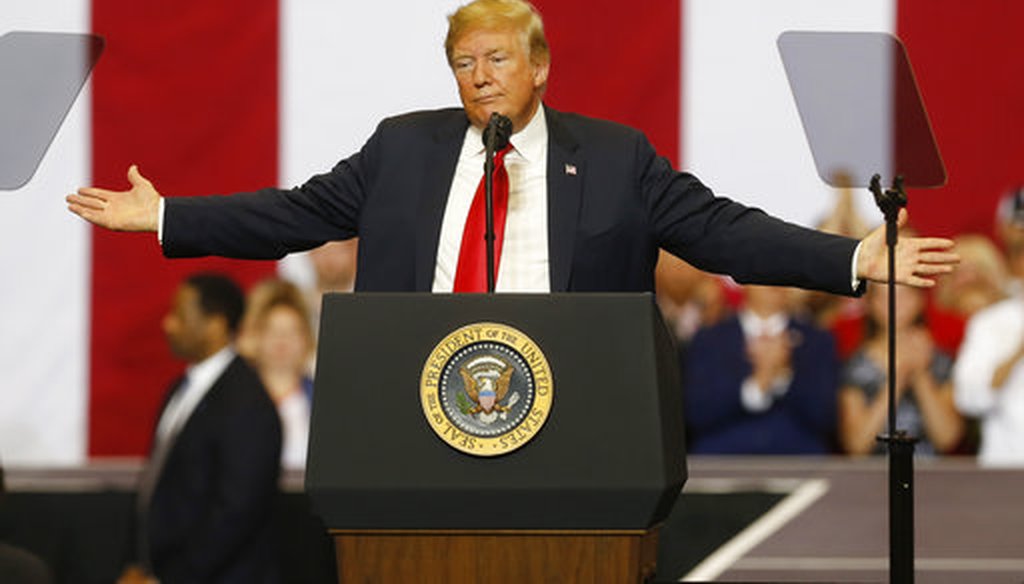Get PolitiFact in your inbox.

President Donald Trump speaks at a campaign rally on June 27, 2018, in Fargo, N.D. (AP Photo/Jim Mone)
President Donald Trump headed back to the campaign trail to promote the candidacy of Rep. Kevin Cramer, the Republican challenger to North Dakota Democratic Sen. Heidi Heitkamp.
In his rally on June 27 in Fargo, N.D., Trump made a number of statements that were inaccurate or misleading. Here’s a sampling.
"Millions and millions of people are signing up (for association health plans)."
Trump is wrong to say millions of people "are signing up," present tense.
Trump is referring to his administration’s effort to expand "association health plans," under which associations such as trade groups are cleared to sell insurance. The administration wants to allow these plans to sidestep consumer protections under the Affordable Care Act, which would enable less-expensive insurance options on the market.
One estimate by the health-care analysis firm Avalere found that association health plans could lower premiums for younger, healthier people, leading a projected 4.3 million people over five years to leave their current Affordable Care Act insurance for association plans.
But it’s important to note that this exodus hasn’t happened yet, contrary to Trump’s use of the present tense.
In fact, the major association health care plan rule is being phased in between August 2018 and April 1, 2019, depending on the type of association and the type of plan they are offering, said Kevin Lucia, a research professor at the Center on Health Insurance Reforms at Georgetown University’s McCourt School of Public Policy.
"Democrats want open borders and crime, crime, crime happens automatically when you have those open borders"
Trump has consistently distorted the Democrats’ position. Trump bases this attack on Democratic opposition to his promised border wall with Mexico. Democrats argue a border wall is costly and not the most effective tool to combat illegal immigration and crime. Instead, they favor other types of barriers, technology, increases in border personnel and other improvements.
"Open borders, @realDonaldTrump? The bipartisan immigration bill I authored had $40 billion for border security and would have been far more effective than the wall," Senate Minority Leader Chuck Schumer, D-N.Y., tweeted June 21 in response to Trump’s repeated claim that Democrats "want open borders."
The top House Democrat, Nancy Pelosi, D-Calif., also rejected Trump’s characterization of her party’s views as she criticized the Trump administration’s "zero-tolerance" immigration policy that led to the separation of children and their parents, and claims that children are kept in cages.
"No, we do care about the border. We care about protecting our country, but we don’t think we need to protect the border by putting children in cages. We want to be smart and strong not reckless, rash and ruthless in this case," Pelosi said on June 21.
"Nancy Pelosi has gone out and wants to protect (MS-13)."
Trump has said this before. It’s False, and a misrepresentation of what Pelosi has said. Pelosi defended all undocumented immigrants after Trump characterized as "animals" some people who come to the United States.
Trump made the "animals" remark in May during an immigration meeting at the White House. He did not specifically say MS-13 gang members are "animals," yet his statement came after a sheriff spoke about "bad guys" and MS-13 gang members. Some lawmakers interpreted Trump as saying all immigrants are "animals."
A day after Trump’s "animals" comment, Pelosi said "calling people animals is not a good thing" and defended "undocumented immigrants." But she did not mention MS-13 gang members or come out in their favor, as Trump has falsely claimed.
"We have already started (the border wall). $1.6 billion. We are getting the wall built."
Trump has said this before, too. It is misleading and something we’ve rated Mostly False.
Congress appropriated $1.6 billion to replace existing border fencing and to add some new barriers. But that money was not for the border wall Trump promised. Even though wall prototypes were built, the Department of Homeland Security has told us it "does not anticipate" that a single prototype will be selected as the design standard for future border wall construction. "Rather, the eight different prototypes are each anticipated to inform future border wall design standards in some capacity," U.S. Customs and Border Protection spokesman Carlos Diaz told PolitiFact in April.
Trump is still actively advocating for funds for his border wall, even though he promised Mexico would pay for it. PolitiFact California has also given a Mostly False rating to Trump’s claim that border wall construction has started in San Diego.
"Now, for the first time in 22 years, wages are rising again."
We have rated similar claims, made by Trump, Mostly False. Inflation-adjusted wages climbed, with occasional blips, throughout President Barack Obama’s second term. "Again" suggests this is a new development.
Median weekly earnings hit their post-Great Recession low in the second quarter of 2014, at $330 (that’s for full-time wage and salary workers). They climbed to $351 as Obama was leaving office — a 6.4 percent increase over about three years. The most recent data under Trump, for the first quarter of 2018, shows it at $350, or slightly below where it was when Obama handed over the reins to Trump.
"We went to Michigan, we went to Wisconsin, we went to places that haven’t been (won by a Republican presidential candidate) — I think Wisconsin was 1952, Dwight Eisenhower — and we won Wisconsin."
That’s incorrect. Eisenhower did win Wisconsin in 1952, as did Trump in 2016. But six other Republican presidential nominees won the state in the interim: Eisenhower again in 1956, Richard Nixon in 1960, Nixon again in both 1968 and 1972, and Ronald Reagan in both 1980 and 1984.
So, from 1952 to 2016, the GOP won Wisconsin in the presidential race eight times -- almost at parity with the Democrats’ nine.
"Michigan is very happy with your president."
Polling doesn't show that. The most comprehensive look at Trump’s approval state by state comes from surveys by the firm Morning Consult. In May 2018, Trump has a 43 percent approval rating in Michigan, compared to 52 percent of respondents who disapproved. Pollsters call this being nine percentage points "under water."
That compares unfavorably with Trump’s position in Michigan at the beginning of his tenure in office. In January 2017, his ratings in the same survey were 48 percent approval, 40 percent disapproval, or eight percentage points "above water." So Trump has shifted a total of 17 points in the negative direction, according to Morning Consult.
Other polls show similar patterns.
In the most recent state-by-state Gallup poll, released in January 2018, Trump was 15 points under water in Michigan -- 40 percent approval, 55 percent disapproval. A poll released a few weeks later by the Detroit News and WDIV-TV had similar numbers -- 40 percent approval, 54 percent disapproval.
"I was given North Korea, where frankly we were very close to going to war."
There’s no doubt that relations were frosty -- if not frigid -- with North Korea before Trump took office. But it’s a significant exaggeration to say that war was imminent before Trump took office.
"There was no indication that North Korea was preparing to attack prior to U.S. escalation of threats," said Robert S. Ross, an Asia specialist Boston College and Harvard University.
Evans J.R. Revere, a senior fellow with the Brookings Institution’s Center for East Asia Policy Studies, agreed.
"We were nowhere near war with North Korea when Trump entered office, although the situation was becoming increasingly serious as Pyongyang continued to develop nuclear weapons and missiles," Revere said.
In fact, Ross said, it was Trump’s own escalation of tensions -- such as his calling North Korea’s Kim Jong Un "little rocket man" -- that have a better claim on bringing the two nations closer to war.
"That there is less likelihood of war now is because the president retreated from his threats, without it being clear that he received any commitments from North Korea that North Korea had not already publicly committed to," Ross said.
Our Sources
Links embedded in article.










































